Health screeners are a great way to navigate the twists and turns that life can throw at you. For veterans, it is more than a routine. It’s a powerful tool to safeguard their well-being and ensure that they are mission-ready at all times. Whether it’s the aftermath of combat or everyday life, understanding the importance is the key to unlocking a healthier future. Let’s take a look at these checkups to change your health.
Table of Contents
What Are Health Screeners?

Definition and Purpose
Health screeners are tools that are used to identify health issues early. Even more amazingly, it can detect conditions and health risks even before symptoms sometimes.
Here is what these screenings include:
- Variety of tests
- Evaluations
- Assessments
They can detect issues like high blood pressure, diabetes, mental health conditions and more.
Types of Health Screeners Relevant to Veterans
- Physical Health Screenings
Veterans often have physcial health issues because of their work environment. These physical screenings can detect conditions like cardiovascular disease, respiratory problems and musculoskeletal injuries.
- Mental Health Screenings
Mental health issues are common among veterans and can affect their physical health. Luckily, mental health screening can detect it early. These issues include PTSD (Post-Traumatic Stress Disorder), depression and anxiety.
- Specialized Screenings
Veterans may need specialized screenings due to their exposures during service. Examples include burn pits and toxic substances. These screenings can asses their respiratory health.
But this is not all that it’s good for. It can also assess hearing and vision, which is crucial for veterans.
Benefits of Regular Health Screeners for Veterans

Regular health screeners are incredibly beneficial to veterans. This section breaks it down!
Improved Quality of Life
Veteran’s lives are significantly improved through regular screenings. This proactive approach to health identifies potential issues early. This improves their overall well-being which enables them to fully enjoy their lives.
Preventive Care and Cost Savings
While preventative care costs money, this investment saves more in the long run than you might think. Early detection means early treatment, which reduces the financial burden that comes with treating advanced diseases.
Access to Veteran-Specific Resources
Other than improving health and saving money, it actually connects veterans to additional resources.
Here is a list of these resources:
- Specialized treatment programs
- Support networks
Now, what is that good for? The VA offers many services to assist veterans in managing their health. Participating in screenings can open up all the goods they have to offer, such as counseling and rehabilitation.
Health Screening Checklist

General Recommendations
Veterans should have a physical exam every year. Now, let’s take a look at screening based on age and gender below.
Screenings by Age and Gender
For Veterans Aged 18-39
- Blood Pressure Check: Every 1-2 years.
- Cholesterol Check: Every 5 years, or more often if at risk.
- BMI Assessment: Every year.
- Mental Health Screening: Annually or as needed.
- Hearing Test: Every 3 years.
- Vision Exam: Every 2 years.
For Veterans Aged 40-64
- Blood Pressure Check: Every year.
- Cholesterol Check: Every 4-6 years.
- Diabetes Screening: Every 3 years.
- Colorectal Cancer Screening: Begin at age 45; every 10 years, or as recommended.
- Mental Health Screening: Annually or as needed.
- Hearing Test: Every 3 years.
- Vision Exam: Every 2 years.
For Veterans Aged 65 and Older
- Blood Pressure Check: Every year.
- Cholesterol Check: Every year.
- Diabetes Screening: Every year.
- Colorectal Cancer Screening: Continue based on results and the physician’s recommendations.
- Prostate Cancer Screening (PSA): Discuss with your doctor annually.
- Mental Health Screening: Annually or as needed.
- Hearing Test: Every 2 years.
- Vision Exam: Every year.
Additional Screenings
- Post-Traumatic Stress Disorder (PTSD) Screening: It is recommended at any age, especially if veterans experience symptoms like flashbacks, anxiety, or mood swings.
- Traumatic Brain Injury (TBI) Assessment: This is incredibly important for those with a history of head injuries, regardless of their age.
- Respiratory Health Screening: If veterans have been exposed to hazardous materials (e.g., burn pits, chemicals) during service.
- Hepatitis C Screening: Veterans should be tested if they were born between 1945 and 1965.
- Immunizations: Veterans should stay updated on flu shots and pneumococcal vaccines.
FAQs
How often should veterans get screened?
How often depends on age, gender, and health risks.
What should I do if a screening indicates a health issue?
Schedule an appointment with your doctor to discuss your concerns, do follow-up tests, take the time to learn about the condition, collabrate with the healthcare team to develop a plan and seek support.
Conclusion

Health screeners identify physical and mental health issues early on, which is extremely beneficial for veterans as they are exposed to chemicals and unhealthy work environments. It improves their quality of life, saves money and gives them access to great resources from the VA.
Don’t wait for symptoms to arise – take charge today by scheduling a health screener!





